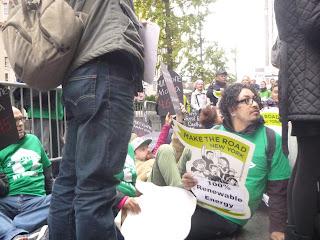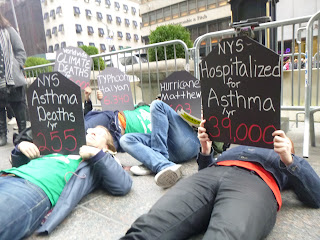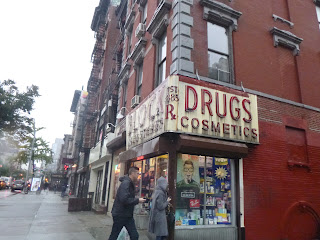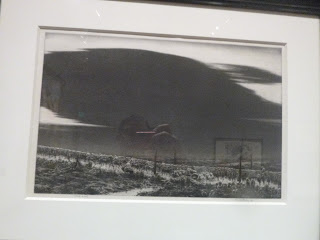 |
| This blogger dying in at Trump Tower and a message from the street. A few images from the Princeton University Museum Nature’s Nation show below.  |
 |
| An anonymous installation on the Manhattan Bridge bike path. |
With Benjamin Heim Shepard and Todd Tif Fernandez.
Oy veh, I wrote on facebook Sunday.
My friend Sarah Schulman corrected my spelling,
reminding me the term literally means, “oh woe” vey ist mir = woe is me.
Another day in America.
What have we become,
Cleve Jones wondered, reflecting on the news about
the murder of 11 Jews who were worshiping in the Tree of Life
Synagogue earlier in the day.
Screaming Get Up, Get Down! There’s an environmental
movement in this town,
we lay down in the front of the home of man whose tilted
us so far away from science, consideration, and common sense.
I think of the mural I saw earlier in the weekend, images of the anthropocene: toxic waters, mass death, an signs of the end of something we might not get back.
We have a narrow window to turn this around, declares an activist at Trump Tower.
I usually cringe at warnings of apocalypse.
But the UN report changed that.
The image of the mural from the lower east side comes to mind:
"Sadness is a organ
we're born with it
so we may swim in the sea
and wave to the sky
one last time with hands that become feathers
try to levitate over this city."
It reminds me to fly as I ride to the action.
I pass some paint and a doll installed on the Manhattan Bridge bike path.
I'm not sure i can levitate.
Looking at the colors of the city,
ideas splash across my mind.
ideas splash across my mind.
Charles King posted on facebook
the day before:
“Make America
great again? It’s the ‘again’ part I have a problem with. We have never done
any thing to redress the genocide we perpetrated on the native people when we came to their land. We have never done anything
to meaningfully redress the impact of chattel slavery in this country. These
two evils lie at the root of the disease within us. And until we do, America
will never be great. Forget about again.” Rev. Michael Livingston,
Riverside Church, October 28, 2018.
I ran back into town from visiting my brother, dropping
off the little one, and canceling morning meetings to make it for an action my
friend Ken told me about: “6 Years After Hurricane Sandy: Stop Trump's Climate
Lies,: organized by NY Renews. The rationale: “October
29 marks the 6th anniversary of Hurricane Sandy. This month, United Nations
scientists told us we need to make drastic changes in the next 12 years to
avert the worst impacts of the climate crisis. Yet, President Trump STILL
continues to cast doubt on the basic facts of climate change. We need bold
action to demand an end to climate lies by our President -- and to raise our
voices to show that New York can lead the way with bold climate solutions.
Right here, we have a chance to set NY on a path to 100% renewable energy. Honor
the New Yorkers who lost family members and homes to a storm made dramatically
worse by climate change -- take action on October 29 and join us at Trump
Tower.”
I
needed something to do with all the feelings pouring through me all day,
looking at the Monday crowds, people running to and from New York, the Monday
beginning, kids dreading school, the party people tired after a wild weekend,
and the horror of what our country has become, with murders in the streets, the
new normal.
The
CUNY Board of Trustees had sent a message earlier in the day:
“The senseless murder of 11 Jews who were worshiping in the
Tree of Life Synagogue in Pittsburgh was the worst anti-Semitic attack in our
nation’s history. Those slayings came only days after two African-Americans
were randomly murdered while they shopped for groceries in a Louisville suburb,
by a white man who had failed to gain entry to a predominantly African-American
church. We were also all horrified by the discovery of explosive devices, some found
near CUNY campuses, that were sent to national leaders last week. We extend our
heartfelt condolences to the victims and families of these vile crimes, and to
all those across the country who have felt wounded by these most un-American
acts, the impacts of which extend far beyond the communities directly targeted.
The effects of hate-provoked violence are harmful to every person who treasures
America’s legacy of pluralism and inclusion, to say nothing of the religious
freedoms that are a bedrock principle of our Constitution. It is important that
we stand together in defense of these values, and in condemnation of those who
would seek to undermine them. Hatred and violence have no place in our society,
and it is imperative that we redouble our efforts to combat them.”
Back
at Trump Tower, the security was waiting us out, noted one of the organizers
from New York Communities for Change.
Todd
Tiff and I lay arm and arm, dying in as activists blocked the entrance, listening
to speeches., each trying to connect the violence of climate change with the
weekend’s violence, mail bombings, and the like.
We’re
all read the reports, “Between
2030 and 2050, climate change is expected
to cause approximately 250 000 additional deaths per year….”
Sarah Schulman wrote.
This is a very
stressful time, five insane things happen every day. The future is
unpredictable. Why not make up with people you are shunning or cold-shouldering? Give up on petty projections and acknowledge your
past positive experiences. Expand community while you still can. Take the
responsibility to help people around you repair.
Its feels good to
be here, I said to Todd and then Ken, who was still not arrested yet.
Activists were
exhorting the governor to sign the New York Climate Act.
Others were
singing:
The Sun is setting
on fossil fuels
The sun is rising
on renewables
And it feels like
dawn.
It feels like dawn
in New York.
The people gonna
rise like water
Gonna shut this
crisis down
I hear the voice
of my great granddaughter
Saying climate
justice now.
I hope it feels
like dawn. It doesn’t feel like it to
me. But it feels good to be with other activists trying to push back. Inaction is not an option. But are we up to the challenge? Each day I lose something else precious. But I need to remind myself activism is a
give and take through history. I go through my days of the Trump era trying to
make sense of things, acting up, getting tired, recharging, refueling, trying
to make sense of it all before I do it again, perhaps crazy for expecting
different results.
The weekend had
started quietly enough.
World Series – Dodgers
vs Red Sock with my friend Rob.
We chatted for
hours, walking through the Lower East Side the next day.
We usually talk
about death and sex.
Happy endings
could be the theme of our conversations about Hart Crane’s untimely demise, my
friends’ stories
of losing lovers to suicide or aids that I wrote about last week, Hemmingway’s
premature departure, Malcolm
Lowry drinking himself to death.
The dia de los Muertos
is coming, noted Rob.
There’s always
something to reflect on in the ways people make their ways to Davey Jones'
Locker.
After perusing the
stacks at Bluestockings, we made our way for some soup at Yonah Schimmel bagel
and continued our conversation about New York.
There are days New
York feels on. The bagels fresh, weather crisp, murals on the streets.
Bob was on his way
to the Merchant Museum. I was off to
read with my study group.
Last time I was at
Yonah Schimmel, Dad and I came down from the Chelsea Hotel, I told Rob,
remembering the fight we had that day, making up later.
You still miss
him?
Yea.
Dylan wrote his best song
there after watching Joan Baez perform there, notes Rob, referring to the Sad Eyed Lady of the Lowlands:
With your mercury
mouth in the missionary times,
And your eyes like smoke and your prayers like rhymes,
And your silver cross, and your voice like chimes,
Oh, do they think could bury you?
With your pockets well protected at last,
And your streetcar visions which you place on the grass,
And your flesh like silk, and your face like glass,
Who could they get to carry you?
We walk up to East
Forth and part ways.
By the time I get
to 37th street, the group is thick into Eros and Civilization.
We each
participate in our own domination, notes Stanley, 85 years and still teaching.
“Under
conditions of a truly human existence, the difference between succumbing to
disease at the age of ten, thirty, fifty, or seventy, and dying a
"natural" death after a fulfilled life, may well be a difference
worth fighting for with all instinctual energy. Not those who die, but those
who die before they must and want to die, those who die in agony and pain, are
the great indictment against civilization. They also testify to the
unredeemable guilt of mankind. Their death arouses the painful awareness that
it was unnecessary, that it could be otherwise. It takes all the institutions
and values of a repressive order to pacify the bad conscience of this guilt.
Once again, the deep connection between the death instinct and the sense of
guilt becomes apparent. The silent "professional agreement" with the
fact of death and disease is perhaps one of the most widespread expressions of
the death instinct -- or, rather, of its social usefulness. In a repressive
civilization, death itself becomes an instrument of repression. Whether death
is feared as constant threat, or glorified as supreme sacrifice, or accepted as
fate, the education for consent to death introduces an element of surrender
into life from the beginning -- surrender and submission. It stifles "utopian"
efforts. The powers that be have a deep affinity to death; death is a token of
unfreedom, of defeat. Theology and philosophy today compete with each other in
celebrating death as an existential category: perverting a biological fact into
an ontological essence, they bestow transcendental blessing on the guilt of
mankind which they help to perpetuate -- they betray the promise of
utopia.”
I last read this
in 2005 with you, I comment. I thought I
understood it then. But maybe I didn’t. It
seems harder this time.
That’s because you’re
smarter now, replies Stanley, offering me a rare back handed compliment.
The battle
between Eros and Thanatos is everywhere in our culture.
For brief moments,
I am consumed with eros. But Thanatos usually
rears its way back.
People are
grounded in their narratives, explains Stanley. Creation stories help us find
reality.
By the end of
the day, Rob and I have made our ways through the Merchant House Museum and its
cremation portraits, images of the dead, and reflections on the city changing
around us, the museum, just a step ahead of the wrecking ball.
Cicero’s words
are on the wall.
“The life of the dead is placed on the
memories of the living. The love you gave in life keeps people alive beyond
their time. Anyone who was given love will always live on in another's heart.”
Toasting to
that, Rob and I say goodbye.
I’m off to see
my brother, who is in town with his younger kid.
We meet up with
mom for the rest of the weekend together, exploring art and taking in
the leaves, playing with our favorite trees in the park.
The kids are
scared of sounds at night.
I am a little
more worried about world they are inheriting.
That afternoon we
walk to the museum. The show is about
climate change and our impacts on the environment.
Monday is the
sixth anniversary of Sandy.
I make my way
back, thinking of what is in store for all of us. I tried to be up all weekend, but the news of
the day lingered, pulling at me. A post from
Environmental Activists reminds me:
Today marks six years since Hurricane Sandy
struck New York. 53 people lost their lives, thousands lost their homes, not to
mention an estimated $20 billion in damages and lasting effects that are still
being felt to this day. And since then, there’s been a parade of devastating
storms that have hit the U.S. — Harvey, Irma, Jose, Maria, Florence, Michael,
and the list goes on.
We know that a changing climate is supercharging these storms, just as we know
that it is contributing to droughts, heat-waves, and other extreme weather. It
seems the only one who doesn’t know it is Donald Trump.
Having once called climate change a “hoax,” President Trump again questioned
the legitimacy of climate change during a recent 60
Minutes interview. Worse than his words have been the actions his
administration has taken to roll back environmental regulations and standards
and leave international agreements.
It is clear that we cannot expect the Trump administration to do anything to
fight back against climate change. That means it’s up to New York. New York has
an opportunity to lead on climate with the Climate and Community
Protection Act (CCPA) – bold legislation that ushers in an
economy-wide transition to renewable energy, creates good, green jobs while
also prioritizing low-income communities of color.
- Team EA
Ken Schles and I talked after the action.
He told me about his experience:
"Glad I did it but did not get arrested. The cops just didn’t want to do it. They set deadline and we broke them and then they set them again and we said go ahead arrest us. They drive cars by. They parked and ten left. They drove a patty wagon by. And it left. They were going to let us protest all day. The action was supposed to last 5 minutes. So instead of it slogging on we declared victory and moved on. An hour of chants and song."
Sometimes all you can do is die-(in) with your friends. Nothing else makes sense. my friend Cleve Jones talks about how activism saved his life.
I can see that every day. Thank you for giving me some place to rage!
Ken Schles and I talked after the action.
He told me about his experience:
"Glad I did it but did not get arrested. The cops just didn’t want to do it. They set deadline and we broke them and then they set them again and we said go ahead arrest us. They drive cars by. They parked and ten left. They drove a patty wagon by. And it left. They were going to let us protest all day. The action was supposed to last 5 minutes. So instead of it slogging on we declared victory and moved on. An hour of chants and song."
Sometimes all you can do is die-(in) with your friends. Nothing else makes sense. my friend Cleve Jones talks about how activism saved his life.
I can see that every day. Thank you for giving me some place to rage!
Jewish Labor Committee Sends Condolences to Tree of Life Congregation
Condemns Domestic Terrorist Act in Pittsburgh and the Climate that Breeds It
October 27, 2018: New York, NY -- The Jewish Labor Committee sends its deepest condolences to the families and friends of those killed by the domestic terrorist who attacked the Tree of Life Congregation during Shabbat services earlier today, and to the entire congregation and the larger community.
This violent terrorist act in Pittsburgh was not the first, although it was the largest such attack against the American Jewish community. Deflecting people's fears, frustrations and anxieties toward Jews, refugees or any minority in society is not new.
We are mindful that this terrorist act was motivated not only by hatred of Jews, but also by hatred of refugees and other migrants, and of those organizations, congregations, and communities aiding them. And this bigotry did not arise from nowhere. Anti-refugee sentiment, expressed in hate-filled rhetoric by the most senior members of the government, has been echoed and amplified in social media and given legitimacy by the mainstream press. The coded messages of anti-Semitism, racism and xenophobia are given free rein not only in extreme alt-right shadows, but increasingly in the conservative mainstream.
The rapid rise of anti-Semitic acts in the United States, including this most recent case of domestic terrorism by a hate-filled home-grown extremist, must be condemned and rejected not only by those directly affected, but by all Americans. We call on all men and women of good will to join us in rejecting anti-Semitism, and all manifestations of racial, ethnic, religious and political bigotry. Not only in Pittsburgh, but across the United States, we need to stand together and confront such hatred, and the violence it breeds.
---------------------
The Jewish Labor Committee, an independent secular non-profit organization, is the voice of the Jewish community in the labor movement and the voice of the labor movement in the Jewish community. Whether through its national office in New York or local offices and lay-led groups across the United States, the JLC enables the Jewish community and the trade union movement to work together on important issues of shared interest and concern, in pursuit of our shared commitment to economic and social justice.
Message from Charles King!
This morning, I shared the following reflection on the events of the last week with the community we call Housing Works:
Dear Staff and Clients,
Last week was a tough one in which to follow the national news. It began with the leak of plans by Health and Human Services to define gender as a binary, immutable condition, defined at birth. Of course, the whole point of this effort is to erase transgender people and deprive them of an legitimacy and of any federal protections from discrimination. Then we saw the President of the United States, who routinely demonizes anyone who opposes him and weaponizes otherness, stirring up fear and hate against desperately poor Central American men, women and children fleeing violence and extreme poverty, traveling thousands of miles mostly on foot, to seek asylum at our nation’s southern border. With the President openly declaring himself a nationalist, we also saw a flurry of Christian white male supremacy played out in the extreme. Public figures who have been subject to insult and attack by Trump began receiving bombs in the mail. Even after the alleged assailant proved to be a rabid Trump supporter, the President doubled down, refusing to take any ownership for his rhetoric and the harm it is causing across the country.
On Friday, a white supremacist attempted to enter a Black church in Jeffersontown, Kentucky. Frustrated that the doors were locked, he went to a nearby Kroger’s and shot and killed a Black man and a Black woman, Maurice Stallard and Vickie Lee Jones, each of who was going about their business, doing their weekly grocery shopping. Then on Saturday, the Jewish holy day, another white supremacist walked into the Tree of Life Synagogue in Pittsburg, Pennsylvania. Apparently enraged by the synagogue’s affiliation with a Jewish non-profit that helps to resettle refugees, he walked into the synagogue and, shouting “all Jews must die,” he shot and killed eleven people. One of the people killed was Jerry Rabinowitz, a family physician who was known for his kindness caring for people living with HIV from the early days of the epidemic. The oldest person killed was 97-year old Rose Mallinger. This appears to have been the most violent act of anti-Semitism ever committed in this country. No less than the massacre in Pulse, both of these latest massacres are painful because people were targeted for who they were even as they were engaged in the most ordinary of affairs. It is hard not to believe, at least in these instances, that the less than subtle appeals to Christian white male supremacy are yielding their evil fruit.
It is hard to absorb so much hate around us. It is tempting to shut down, to turn of the news. For some of us the temptation is to allow fear to paralyze us. For others the danger is that we ourselves become bitter and begin the hate in return. But deep down, we know that none of these responses reflect who we are as a community. We are a diverse community that exists because we believe we can find and offer healing, not just for ourselves, but for the world. Our vision has never been just about helping a few homeless people or treating a few people living with HIV or other chronic conditions. Our vision has been about the elimination of homelessness and ending the AIDS epidemic and other epidemics like it. We have come this far as a community because even in the worst of times, we have dared to dream big and to act in similarly big ways. And we have come so far because we have always stood up for what we believe in no matter what the cost or consequence. Finally, we have come so far because we are a community that believes in radical inclusion, that embraces anyone who is hurting or in need, whether it is helping LGBT folk from around the world in need of asylum or the homeless person sleeping on the A train.
Now is not the time to shut down or give in to fear or bitterness. Now is the time to be more loving, more caring and more compassionate. Now is the time to stand together and to stand strong and proud. It is a time to uphold and affirm our transgender brothers and sisters. It is a time for us to embrace Muslims and Jews in our midst and let them know that we care about them and the attacks on their communities. It is a time to reaffirm that Black lives matter and that we will not accept the demonization of Latinx immigrants, with or without legal papers. It is a time to reaffirm our commitment to addressing racism and misogyny, including structural manifestations of these perversities within our own community. Together we will attend more vigils and protests. Together next week we will vote. Together we will advocate for universal health access and for housing as a human right. Together we will fight for the health and well -being of people who use drugs. But most important of all, together we will be loving and caring of each other. This is who we are.
A day will come with this President will be gone. My prayer is that in working with others to make that so sooner than later, we will contribute to healing our country and opening the doors to addressing the systemic evils that have kept us from being the great nation that we like to think we have been, a nation that embraces its diversity, that welcomes the immigrant, that addresses its wrongs and that provides real opportunity to everyone within its borders and that sees us sharing a common responsibility with the other nations of the world to care for all of humanity and for the globe that we collectively call home.
Love,
Charles




































































































































































































































































No comments:
Post a Comment